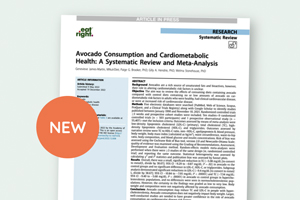A multicentre, randomised study of a thousand people found adding one avocado a day to their usual diet improved their overall dietary intake, modestly improved their cholesterol levels, and had no adverse effects on body weight or body fat.
The HAT Trial (Habitual Diet and Avocado Trial) was a multicentre, randomised, controlled, parallel arm, unblinded trial that tested the difference consuming one avocado a day might make.
This US trial provided one avocado a day to participants for six months and compared this with consuming a habitual diet (consisting of two avocados or less per month) in a group of 1,008 free-living people with elevated waist circumference. Apart from the avocado intake difference, dietary intake was ad-libitum and energy intakes were not controlled.
Daily energy remained stable for the habitual diet group but increased in the avocado group, as did intake of dietary fibre, total fat and monunsaturated fat (in both grams and as a percentage of energy).
After six months there were no significant differences between the two groups in visceral adipose tissue and volume, hepatic fat fraction, high sensitivity C-reactive protein or components of the metabolic syndrome (glucose, triglycerides, HDL cholesterol, blood pressure and waist circumference).
There were also no changes in body weight or Body Mass Index (BMI). There were, however, nominally significant reductions in total and LDL cholesterol in the avocado supplemented group compared with the habitual diet group. People in the avocado group scored significantly higher on the Healthy Eating Index (a diet quality assessment tool).
Practice Tips
- Eating an avocado a day can improve your diet without adverse effects on body weight or body fat
- Eating an avocado a day, with no other changes to your diet, may result in modest improvements in cholesterol levels
Reference
Lichtenstein Alice, Kris-Etherton Penny, Petersen Kristina, Matthan Nirupa et al. (2022). Effect of Incorporating 1 Avocado Per Day Versus Habitual Diet on Visceral Adiposity: A Randomized Trial. J Am Heart Assoc. 2022;11:e025657. DOI: 10.1161/JAHA.122.025657



